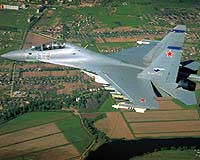| . |  |
. |
Stockholm (AFP) June 2, 2010 Global military expenditures soared to a record high last year, unscathed by the economic downturn, with the United States accounting for more than half of increase, a think tank said Wednesday. In 2009, 1,531 billion dollars (1,244 billion euros) were spent worldwide in the military sector, a 5.9 percent rise from 2008 and a 49 percent jump from 2000, the Stockholm International Peace Research Institute (SIPRI) said in its report. "Many countries were increasing public spending generally in 2009, as a way of boosting demand to combat the recession," explained Sam Perlo-Freeman, the head of SIPRI's military expenditure project. "Although military spending wasn't usually a major part of the economic stimulus packages, it wasn't cut either," he said in a statement. The institute said 65 percent of countries for which data was available had hiked their military spending last year. The United States remains by far the top military spender, dishing out 661 billion dollars to the industry in 2009, or a whopping 43 percent of the total global military expenditure. Washington thus paid 47 billion dollars more than a year earlier and accounted for 54 percent of the global increase, SIPRI said. China is believed to be the world's second largest military spender, the institute said, adding that while it did not have access to the official figures from Beijing it estimated the country had spent around 100 billion dollars in the sector last year. With its 63.9 billion dollars in military expenditures last year, France came in third place, SIPRI said. "The figures also demonstrate that for major or intermediate powers such as the US, China, Russia, India and Brazil, military spending represents a long-term strategic choice which they are willing to make even in hard economic times," Perlo-Freeman said. A portion of the 2009 military spending hike can be attributed to a sharp increase in so-called peacekeeping operations, especially in Afghanistan, which also reached record levels last year. In all, 54 peacekeeping missions took place around the globe in 2009, costing a record total of 9.1 billion dollars, SIPRI said. In terms of deployed personnel, last year was also record-breaking, the institute said: 219,278 people, 89 percent of whom were military personnel, were deployed, up 16 percent from 2008. "The increase was due to troop reinforcement for existing peace operations, most significantly for the NATO-led International Security Assistance Force (ISAF) in Afghanistan," the report said. The United States last year "more than doubled its troop levels in Afghanistan and annual US spending in Afghanistan now exceeds that in Iraq," SIPRI said, pointing out that 65 billion dollars had been proposed for Afghanistan operations in the 2010 budget request, while 61 billion had been set aside for Iraq. Most of the military spending in Afghanistan had gone towards "counter-terrorism, counter-narcotics and the strengthening of the Afghan security forces," the institute said. The institute however voiced some optimism that the military operations in Afghanistan could soon end, pointing out that "the international community is clearly weary of the struggle." "Two NATO members have already unilaterally decided to pull out (and) there is a tangible and growing sense of 'end game' in and around Afghanistan that is likely to intensify over the next 12 months," it said. Wednesday's SIPRI report also estimated that there were around 8,100 operational nuclear warheads in the arsenals of the world's eight nuclear-armed states: the United States, Russia, China, Britain, France, India, Pakistan and Israel. "Of these, almost 2,000 were kept on high alert and capable of being launched in minutes," the report said.
Share This Article With Planet Earth
Related Links The Military Industrial Complex at SpaceWar.com Learn about the Superpowers of the 21st Century at SpaceWar.com
 Algeria 'to cut U.S. arms, go Russian'
Algeria 'to cut U.S. arms, go Russian'Algiers, Algeria (UPI) Jun 1, 2010 Algeria's defense ministry plans to cut arms purchases from the United States because of lengthy delivery delays and concentrate on Russian weapons systems, the El Khabar newspaper reports. Russia's state arms exporter Rosoboronexport has signed two contracts worth $1.2 billion to deliver 16 Sukhoi Su-30 multi-role fighters to Algeria and six to Uganda, Russia Veomosti daily reported Mo ... read more |
|
| The content herein, unless otherwise known to be public domain, are Copyright 1995-2010 - SpaceDaily. AFP and UPI Wire Stories are copyright Agence France-Presse and United Press International. ESA Portal Reports are copyright European Space Agency. All NASA sourced material is public domain. Additional copyrights may apply in whole or part to other bona fide parties. Advertising does not imply endorsement,agreement or approval of any opinions, statements or information provided by SpaceDaily on any Web page published or hosted by SpaceDaily. Privacy Statement |